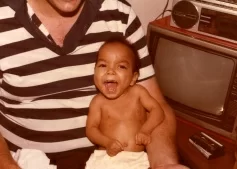 without a thought on my part. But Luke came to my mind yesterday and I looked up some information on him and discovered that his birthday had just passed. I found this old article that I wrote about Luke a few years ago. I thought I'd share it again. I am convinced that there are important and significant lessons we can learn from his life, and that I need to regularly share what I think they are. I hope you enjoy this!
without a thought on my part. But Luke came to my mind yesterday and I looked up some information on him and discovered that his birthday had just passed. I found this old article that I wrote about Luke a few years ago. I thought I'd share it again. I am convinced that there are important and significant lessons we can learn from his life, and that I need to regularly share what I think they are. I hope you enjoy this!The mysteries of God are a part of the Christian life that can often lead to confusion, doubt and even discouragement for believers.
- For some, it's a pride thing. We want to have answers – we want to understand, to be able to grasp the complexities of Biblical truth and God's plan for mankind.
- For some, God's mysteries – the unexplained things of life – are stumbling blocks to faith:
1. Why do bad things happen to good people?
2. Why does He allow pain, suffering and evil to thrive in our world?
Several months ago we were witnesses to the aftermath of the tragedy in Pennsylvania involving the Amish community, where, good, decent, hard working, non violent people were subjected to unspeakable cruelty towards their children. How can this happen?
3. One of our CSC children, who grew up in the worst poverty imaginable in Cebu City, was adopted into a family in the United States several years ago. Well meaning people would tell her how lucky she was and how God obviously had a wonderful plan for her life. She had a hard time with that and would sometimes ask her parents, "But what about all the kids who are still there, who weren't adopted, and who are still suffering and dying? What is God's wonderful plan for their lives? Why me and not them?
For many of us, we celebrate the goodness of God in our lives, we praise him for his healing, for material comforts, for blessing our efforts – even as we observe people who remain sick or disabled, who suffer in poverty – those who efforts and initiatives end in disappointment and ruin.
There are two extremes in terms of people's reactions to the things about God and life that are not understood.
1. There are those who try in vain to grasp the ungraspable – to be able to reduce the mysteries to understandable formulas or explanations. I remember a young seminarian who came to Cebu and who filled the pulpit of our church on a Sunday evening. He preached for an hour on the "peace of God that passes all understanding." Perhaps he felt that if he preached long enough he could crack that nut and open our understanding!
We all know those who have reduced the book of Revelation to precise charts and timetables, giving us easy to understand categories for all of human history and, most especially, the times to come.
2. A second category are those who shake their heads and say, "We'll only know these answers when we get to heaven." They suspend inquiry, not bothering to seek answers to the perplexing questions of life.
Living and working in a Third World country like the Philippines brings some of these mysteries to the front of our lives. Poverty, and all that goes with it, is "in your face." People often ask me "How do you like living in the Philippines?" That's a tough one to answer. Life anywhere has its highs and lows. Some days are great, others are difficult. I often answer this way:
1. When I'm sitting down to a nice breakfast I am aware that, within a few meters of my house are families that have no breakfast.
2. When I'm driving to the office or the Shelter I often pass people walking along the road who, for lack of a few cents can not even afford public transportation and must walk.
3. When I stop to buy medicine for my family or the CSC kids, there are people standing nearby whose children are dying for lack of that very same medicine.
Why am I blessed and they are not?
I recall a conversation with a missionary a few days after Cebu was hit by a strong typhoon. Many of our CSC workers lost their roofs or their entire homes. The houses of the poor were devastated by the high winds and torrential rains. The missionary said that it had been such a miracle how God spared the missionary homes from damage, holding his hands of protection around us during the storm. I remember wondering whether it wasn't more a matter of our having cement houses and strong metal roofs.
Why did our CSC kids have to suffer so much? And how much more, those who live on the street and cannot be admitted to CSC?
These are tough questions. When it comes to trying to understand our own suffering, the Bible gives some answers. For example, Romans 5:3-4 tells us that suffering produces perseverance, perseverance character, and character, hope. And the Bible gives us additional hope that we will someday come to see God's purpose and mysteries:
"But now we see through a glass dimly, but then face to face."
And we hear the testimonies of Christian brothers and sisters who have lived through terrible times and have turned negatives into positives in their lives.
Several months ago I was attending a conference in Bismark, North Dakota. One of the featured speakers was Steve Saint, Steve's father, Nate Saint, was one of the five missionaries killed in 1956 by Aucan warriors in Equador. Steve told about what that tragic day meant to his family, and what it was like when his dad, his hero, didn't come home that day. We saw video of his current family life, and saw a man who was interacting with Steve's children, and who was being referred to as "Uncle." It turns out that this was the very man who had killed Steve's father, who had come to know Jesus and had experienced the forgiveness of God and of the Saint family and now was a part of their family – an amazing story of how good things had come out of tragedy and suffering.
So the clear message is that God has a plan for our lives, we will discover that plan in the right time. He is writing our life's stories, but some of the chapters are difficult ones.
We can understand this. We can, when aided by the Holy Spirit, see how difficulties and suffering are part of a purification process for us, and that we, like Job, will eventually be better people for it.
But what about people who, because of major disabilities, are unable to understand their situation, unable to discern the hand of God or his plan for their lives. Where is the purification and growth and ultimate value for these people? What could God's purpose possibly be?
Back on 1982 a baby was born in a charity ward in a small hospital in Cebu City. 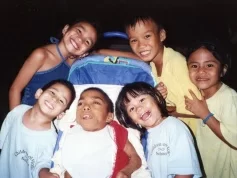 The baby underwent cardiac arrest during birth and was without oxygen for an extended time. Unlike many cases of charity patients, the hospital staff decided to resuscitate the baby, even after he had suffered massive brain damage and cerebral palsy. The baby's mother abandoned him in the hospital, and after a couple months Luke was referred to CSC. When we took him in he appeared to be a bouncing baby boy. We did not know that he would not develop physically beyond about a year and a half, or mentally beyond a few months. Luke would never speak, nor have voluntary movement of his arms or legs.
The baby underwent cardiac arrest during birth and was without oxygen for an extended time. Unlike many cases of charity patients, the hospital staff decided to resuscitate the baby, even after he had suffered massive brain damage and cerebral palsy. The baby's mother abandoned him in the hospital, and after a couple months Luke was referred to CSC. When we took him in he appeared to be a bouncing baby boy. We did not know that he would not develop physically beyond about a year and a half, or mentally beyond a few months. Luke would never speak, nor have voluntary movement of his arms or legs.
Luke became a fixture at CSC. For over 23 years he was an integral part of our lives and a symbol of CSC and what we are all about.
Many times Luke would be hospitalized – often due to upper respiratory infections. He fought for his life many times. There were at least a dozen times when we were sure that he would die. The doctors had told us that he wouldn't make it past five years old. Then they revised it to nine, then 11 – certainly he wouldn't reach his teenage years.
One time, when Luke was critically ill our staff met to pray and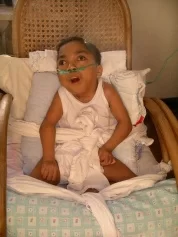 I asked them to reflect on his life. Here is why: I believe that God had a purpose for Luke's life when he created him. I believe that He uses people like Luke to teach us important things. But here is the rub: If we don't spend time reflecting on these lessons, then Luke's life is useless. Its up to us to allow God to make sense of Luke's life.
I asked them to reflect on his life. Here is why: I believe that God had a purpose for Luke's life when he created him. I believe that He uses people like Luke to teach us important things. But here is the rub: If we don't spend time reflecting on these lessons, then Luke's life is useless. Its up to us to allow God to make sense of Luke's life.
And what are the lessons that we found? What has God taught us through his life?
1. First, life is precious. Even though he had nothing to live for, from the world's point of view, Luke clung to live almost ferociously. Some of us who have much more to live for take life casually, we take life for granted. Not Luke. Every day was a struggle. Every breath had to be fought for. Life is a gift from God and we should treat it carefully.
2. God has provided us with opportunities, through Luke's life, to minister to him in significant and life-saving ways. He has provided an avenue for us to live out the biblical mandate to minister unto the "least of these," because, truly, Luke was in that category. Hundreds of people have been given a blessing to participate in the support of CSC that reaches out to children like Luke and many others with other special needs.
3. In so doing, He has given us a chance to show others a Godly value system that doesn't reserve love and attention for those who have something to give back, or who have "potential" or a bright future. For many people who live in a developing country, where resources are limited, this has been a difficult lesson to learn. How could we justify spending so much money for Luke's hospitalization when other, "normal" kids needed care? Luke's life gave us the opportunity to teach about the value of life and about how God looks at all of us.
4. Luke has been a tremendous ambassador for CSC. People around the world remember observing the loving care that he received by our staff and workers. They remember his famous smiles. They may quickly forget the names of the staff or other children, but they remember Luke. "How's Luke doing?" we get asked wherever we go to talk about the ministry of CSC. And our care of Luke helps us explain the true nature and core values of our work in the Philippines.
5. Luke has been a safety valve for those that had an opportunity to know him. My job as Field Director of CSC involves lots of administrative chores, like making budgets, government relations and various kinds of problem solving. There are days when I get stressed out and start to feel the weight of the world on my shoulders. But all I needed to do is to drive a few short miles to where Luke lived, to hold him in my arms, and I get a clear picture of what real struggles are all about. My struggles paled in comparison to what Luke faced every day. Self pity may be easy for some people, but those that knew Luke have no excuse for feeling sorry for themselves. What a great gift that was to all of us.
A little over a week before we left Cebu, Marlys called me on my cell phone and told me that I should get to the hospital quickly, as Luke wasn't doing well. He had been hospitalized for over a week and his breathing was bad. I had gotten messages similar to this one throughout Luke's life, so I went to the office and took care of a few things. But the Lord laid it on my heart to go see Luke and when I entered his room his breathing was extremely labored. He looked different than I had ever seen him, and it became clear that he was dying. I sat down next to him, kissed him and looked into his eyes. For 23 years we had loved this boy. It wasn't easy to say goodbye. I said to him, "Luke. You can go. Go to be with Jesus, Luke. I love you." Within a couple of minutes Luke took his last breath. 23 years of pain, suffering, limitations, hospitalizations, forced breathing, skin rashes and infections were over. We would never see Luke's smile again.
As Luke was dying in that hospital room, I made a promise. I'm not sure if I was making a promise to Luke, to God or to myself. But I decided then and there that I was going to talk about Luke on our coming furlough. I believed then and do now, that the church of Jesus Christ needs to hear about Luke, that the lessons of his life are important ones. Many Americans are complainers - full of self pity. People who have so many material comforts are unsatisfied. American discourse is increasingly a chorus of victim and entitlement claims. Charles Sykes, in his book "A Nation of Victims: The Decay of the American Character" states that, "in a nation where everyone is a victim, no one is a victim." In our preoccupation with our own needs we have a hard time seeing the needs of others – people like Luke.
In his song "God Help the Outcasts," the Hunchback of Notre Dame poses several difficult issues:
I don't know if there's a reason
Why some are blessed, some not
Why the few You seem to favor
They fear us, flee us,
Try not to see us.
The first part we have already examined. The second is our call to arms. "Why the few You seem to favor, they fear us, flee us, try not to see us."
I don't know what factors might make it difficult for us to see the needs of society's outcasts. Perhaps we are too busy. Maybe our personal and church calendars are so full that there just isn't room for Luke, or the man who had fallen to thieves at the side of the road, to break into our day. Maybe we are numbed or fatigued by the needs of others, or simply overwhelmed by the circumstances of our own lives. Maybe we have become cynical. "Why did that guy travel this road at this time carrying that amount of money? He deserves what he got!"
Maybe, just maybe, Luke can help cut through the apathy, the self-centeredness and cynicism of our lives. He was a person with significant needs that he didn't cause. He was totally dependent on others to live. His life had none of the possibilities and opportunities that we take for granted every day. He needed us so very much. Maybe Luke can serve as a symbol of many others that we come into contact with. Maybe Luke can help us rescue our lives.
Teen/Young Adult Transitional Home Status After the Typhoon
Before Typhoon Rai (called Odette in the Philippines) made its landfall in Cebu, City, preparations such as cutting the big branches of the trees and safely piling them in the front yard were already made to minimize risks and hazards in the facility. The residents and houseparents prepared the plastic drums to store water, secured the appliances and furniture in the living room, and ensured the safety of Teen/Young Adult Transitional Home for the upcoming Typhoon.
On December 16th, 2021, Typhoon Odette made landfall in Cebu, City. The staff and residents evacuated for safety and emergency purposes as the wind rose and the typhoon became stronger. The residents felt scared and nervous, as it was the strongest typhoon they have experienced so far. Nonetheless, everyone was calmly praying and reminding one another of the presence and goodness of God despite the calamity. By 11:00 PM, the typhoon had already slightly weakened.
Typhoon Odette left a lot of places devastated with broken homes, downed trees, and loss of electricity, signal, and water supply for days. Fortunately, Teen/Young Adult Transitional Home had a generator that provided the ability to pump water and electricity for light and charging. Some of the trees in Teen/Young Adult Transitional Home also tumbled down, and the debris, iron sheets, and woods were scattered inside the facility. There are also minimal damages in the ceiling of the living room, the roof in the washroom, and broken flower pots. The door separating the facility and CSC Office was also destroyed by the typhoon. The Teen/Young Adult Transitional Home residents took 3-4 days to clean and clear the storm debris. No staff or resident was hurt or injured during the typhoon.
The Typhoon also caused stress and anxiety to the Teen/Young Adult Transitional Home houseparents and residents, especially worrying about the safety and security of their families, relatives, and friends. Consequently, Stress Debriefing Activity was conducted for Teen/Young Adult Transitional Home residents to reduce their stress and help them recover from the overwhelming situation. Through this activity, they recognized their feelings, worries, and stress from the typhoon. The residents also shared their coping mechanisms when dealing with difficult situations. Some of the coping strategies mentioned were reading the Bible, making arts and fictional stories, meditation, watching television, listening to radio/ music, cleaning, planting, and more. Furthermore, the activity ended with breathing exercises to calm and relax their body and mind. Currently, the Teen/Young Adult Transitional Home and the residents are now back to their normal daily activities.
It seems that there is just one crisis after another and we have heard of the desires of the residents to be finally free or "unstuck". In the midst of recovery from the Typhoon and Covid-19 pandemic, the Teen/Young Adult Transitional Home Program continues to look forward to helping its residents take steps to build their future.
Please pray with us as we think of strategies that are safe, yet relevant and meet the needs of the residents who desire to look forward to the day that they can be reintegrated back into the community.
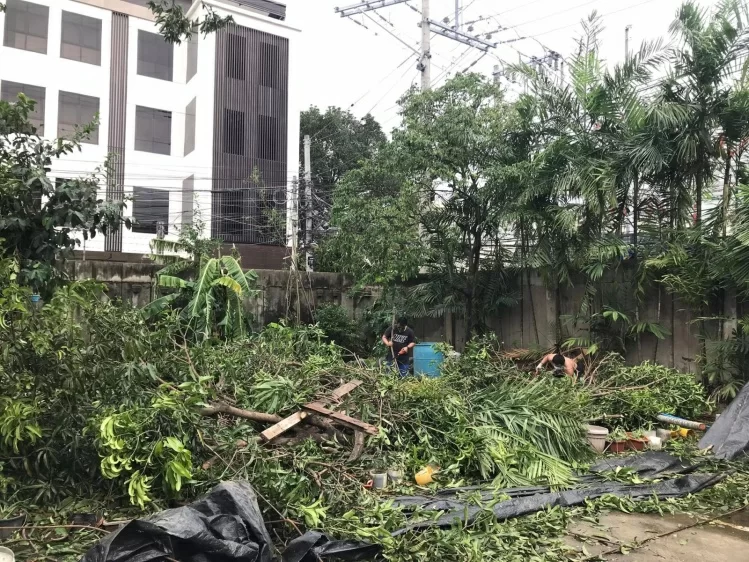 The front yard of Teen/Young Adult Transitional Home facility, during the onslaught of Typhoon Odette
The front yard of Teen/Young Adult Transitional Home facility, during the onslaught of Typhoon Odette
Residents help clear the tree branches and other storm debris in the front yard and parking area.
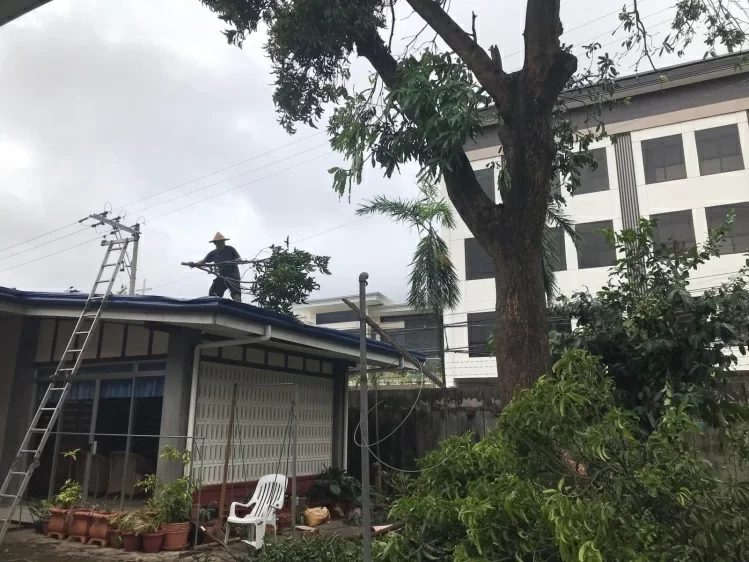 Resident helped remove the branches of the tree on the facility's roof.
Resident helped remove the branches of the tree on the facility's roof.
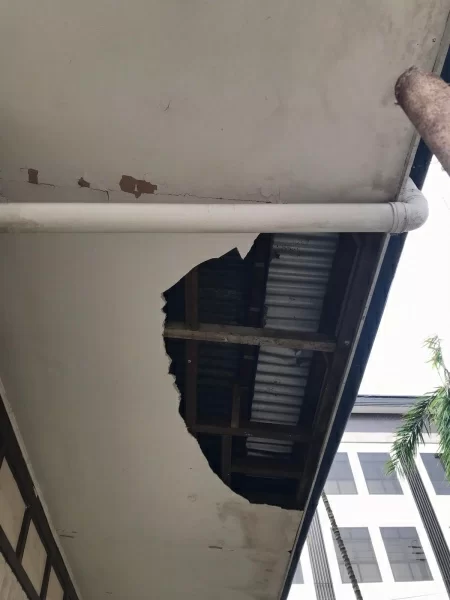
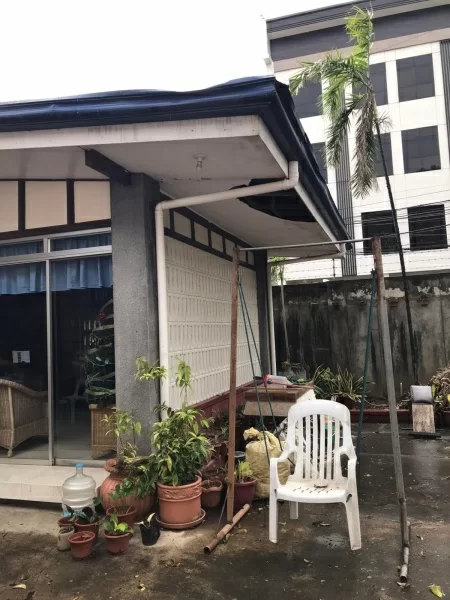 Teen/Young Adult Transitional Home Living Area after Typhoon Odette
Teen/Young Adult Transitional Home Living Area after Typhoon Odette
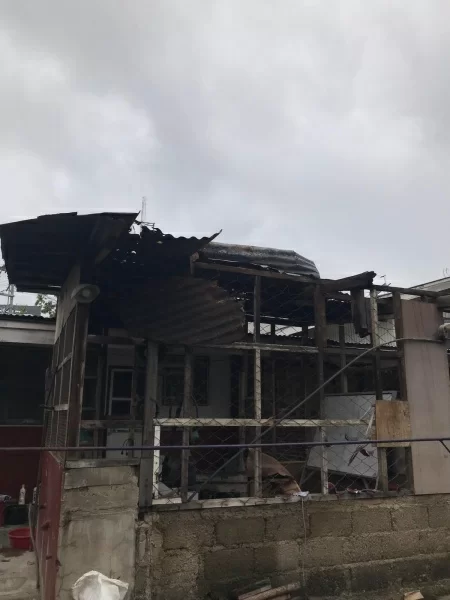
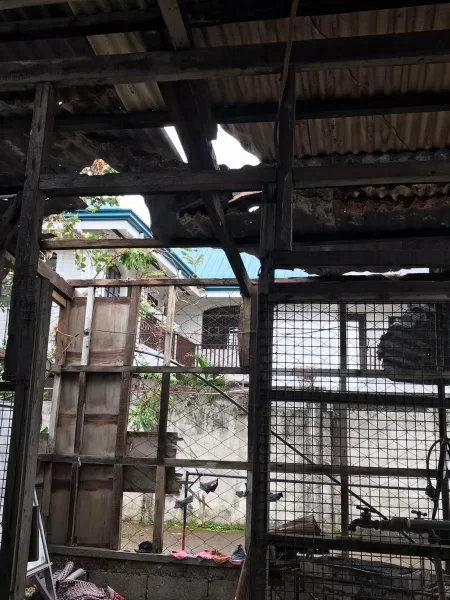 The current condition of the washroom after Typhoon Odette.
The current condition of the washroom after Typhoon Odette.
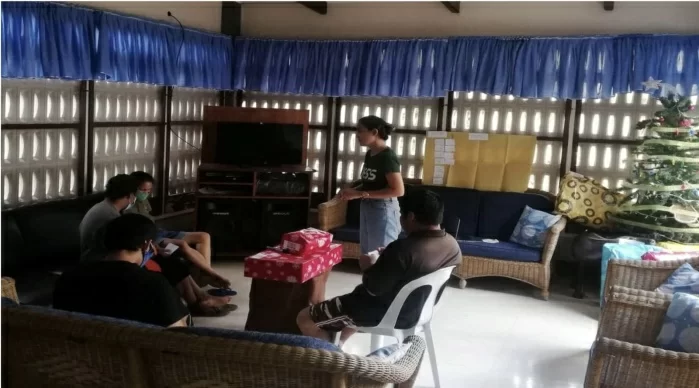 Stress Debriefing Activity to Teen/Young Adult Transitional Home residents on December 21, 2021.
Stress Debriefing Activity to Teen/Young Adult Transitional Home residents on December 21, 2021.
Happy New Year from CSC!
Happy New Year to you all! I wish you all the best in the year ahead. Let me take a minute to reflect on the year 2021 from a CSC perspective—the blessings and the struggles. In the midst of all that is going on in the world today, worry and anxiety could very well consume our thoughts, even at CSC. For all the things that might or might not happen, we rest in confidence that God has a plan for our TODAY and has good things in store for the coming year.

2021 began with the global pandemic still in full swing and the lockdown at CSC in place for nine months. The year ended with super-typhoon Rai making landfall on the islands of the Central Visayas, Cebu at the eye of the storm, leaving a devasting path of destruction. Typhoon recovery is happening slowly just as the next coronavirus variant is beginning to have a negative impact again as well. HOPE is present, though, knowing that our CSC children and staff remained safe and provided for during the storm and afterward, and all are in good health! Our CSC Field Director, Roberto Atienza, shared this week how CSC is a beacon of light in the darkness, offering hope, clean water, a place to "hang out" and charge electronics, providing encouragement to all those who come to us.
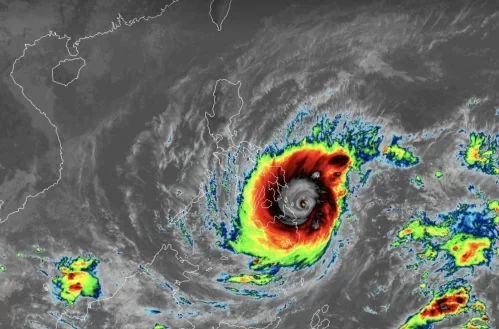
2021 was also a year to celebrate milestones! Birthdays of children, a couple of adoption placements to loving families, work anniversaries of faithful employees, and a new strategic initiative launched! We're excited for all that 2022 will hold and look forward with optimism and HOPE.
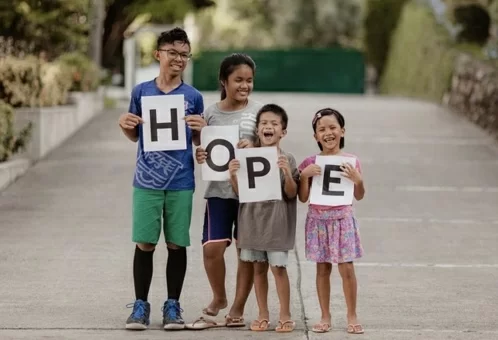
In closing, let me share some verses that I hope will be received as an encouragement to us all:
"Not that I have already obtained all this, or have already arrived at my goal, but I press on to take hold of that for which Christ Jesus took hold of me. Brothers and sisters, I do not consider myself yet to have taken hold of it. But one thing I do: Forgetting what is behind and straining toward what is ahead, I press on toward the goal to win the prize for which God has called me heavenward in Christ Jesus."
Philippians 3:12-14 (NIV)
Grace and Peace in 2022,
Kirby
Typhoon Update
Just before Christmas, super-typhoon Rai hit the Philippines. It was the strongest typhoon to hit the area in 2021, killing more than 350 people and displacing thousands more. The city of Cebu was hit pretty hard. We sustained a significant amount of damage at CSC, including broken doors on the infirmary and the Duterte home, flooding on the main level of Duterte, and our guard shack was destroyed. Multiple trees fell on the Cherne home, on the gate, and all over the property. Debris from other nearby buildings landed on our property as well. Thankfully, our employees and children inside the shelter were safe!
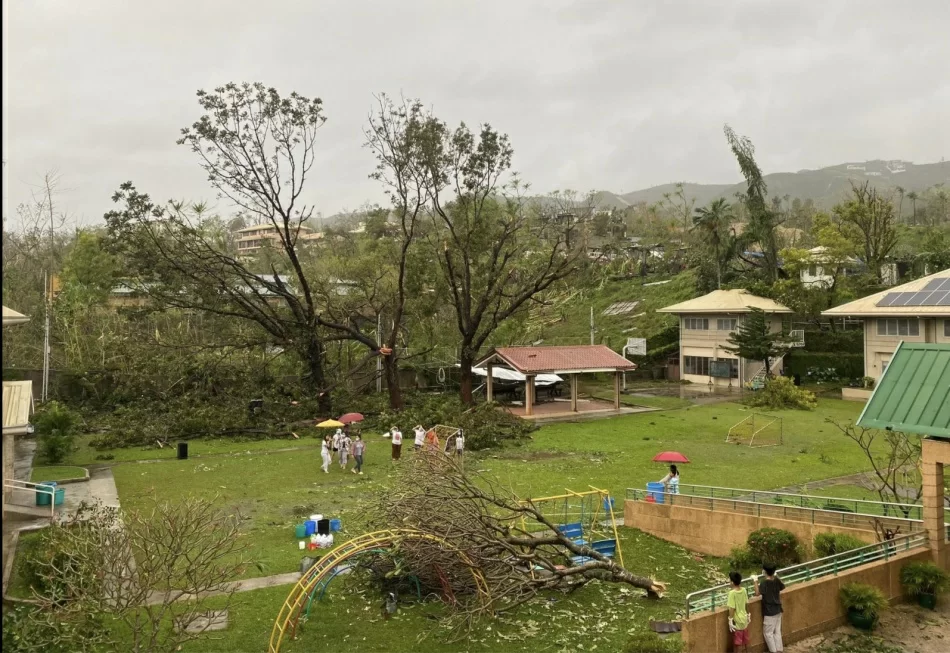
We still do not have power at CSC. They are estimating power will be restored to most of the city by mid-January. We are using generators sparingly to maintain operations.
We are fixing damage at CSC, but we are not collecting funds for typhoon relief outside the shelter at this time. We budget each year for storm damage. This was obviously more than we anticipated, but we are so thankful to our faithful supporters, who have helped us cover these costs.
As we end 2021, we are grateful for so much. We are ending the year strong financially and have enough resources to meet all of our needs. We were in lockdown for the entire year and despite having COVID inside the shelter, we had no major cases. God is steadfast through all the ups and downs.
Thank you for your prayers, financial support and advocacy as we work to care for children in need in Cebu City, Philippines. We are grateful for you!
Time with the Aunties
The counseling department has been proactive in equipping the child care workers, helping them to be emotionally, mentally, and spiritually healthy, so they can provide the best care for our children. During this pandemic, the importance of mental health, has always been emphasized. Thus, activities among locked-in childcare workers, whom we simply called aunties, were done. Sessions of aunties and kids together were also held so that workers will gain a better understanding of the child they cared for.
This activity strengthens the relationship of the residents and workers through mindfulness games. Residents are encouraged to talk about their feelings to their aunties in their daily routines and the workers to understand the children's expression, character, behavior, recognize what children can do, be better listeners and have a better approach in dealing with each child.
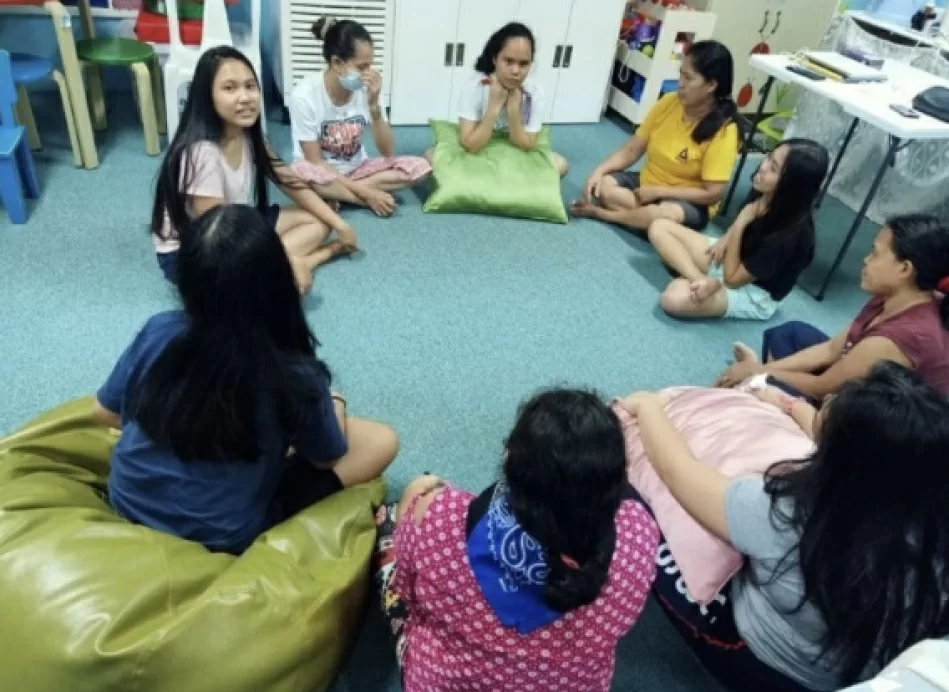
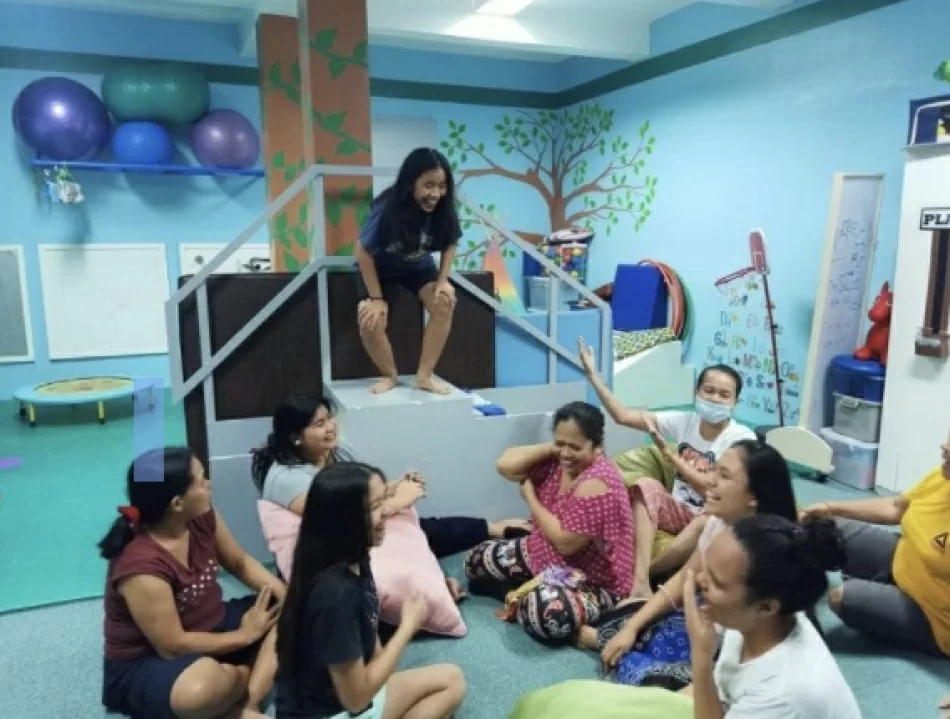
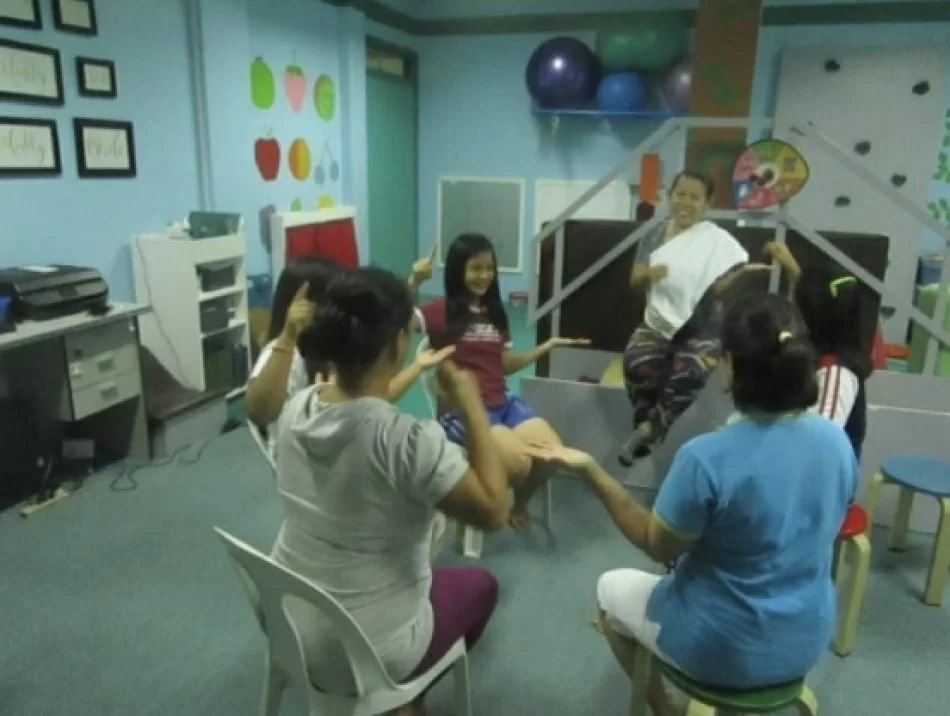
Residents are given time to bond with their choice of aunties and have time to know each other. Counseling is also extending time to workers for their spiritual nurturing through sharing and prayer, understanding their work, and how they face day to day challenges especially while away from their families.
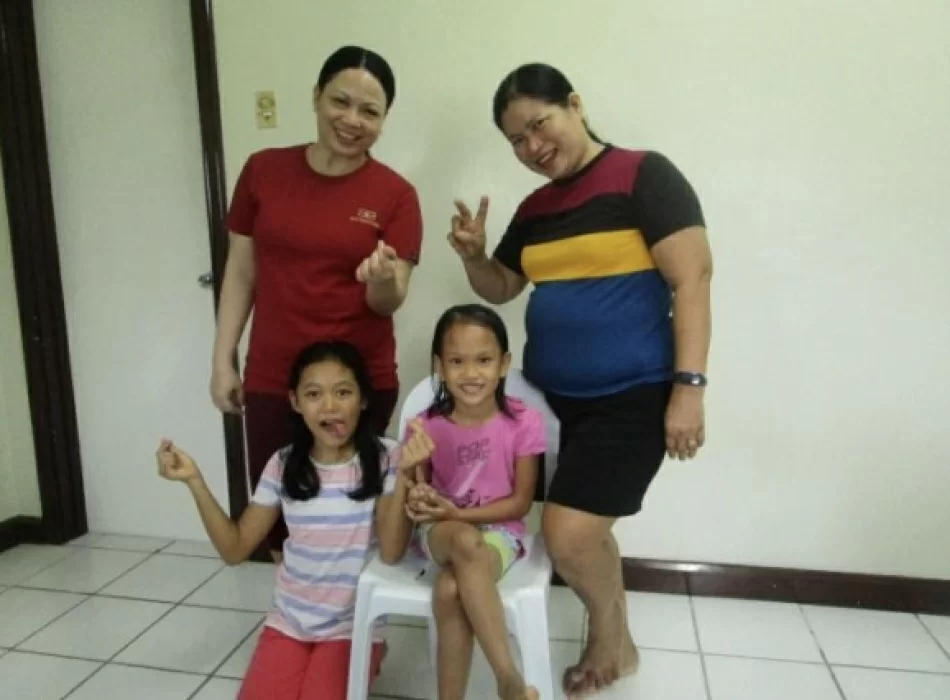
In morning devotions before breakfast and Sunday night after dinner; encouraging them to share their thoughts and ideas of being grateful to God. An illustration was shown about a glass of water. Each one was asked to express what they are thankful or grateful for then the glass will be poured of a little water until everyone has shared and the glass was filled with water. It is just like a thank you tank, once filled it can supply the community or people who needs it. God loves to send down blessings if we are also grateful and thankful to Him. We also express it through songs and Bible verses.
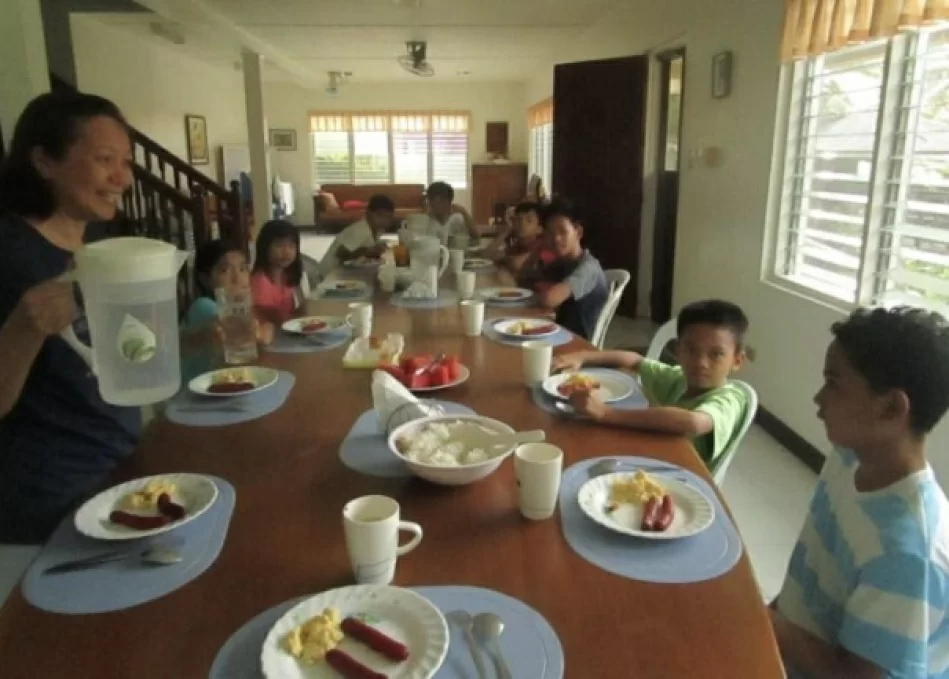
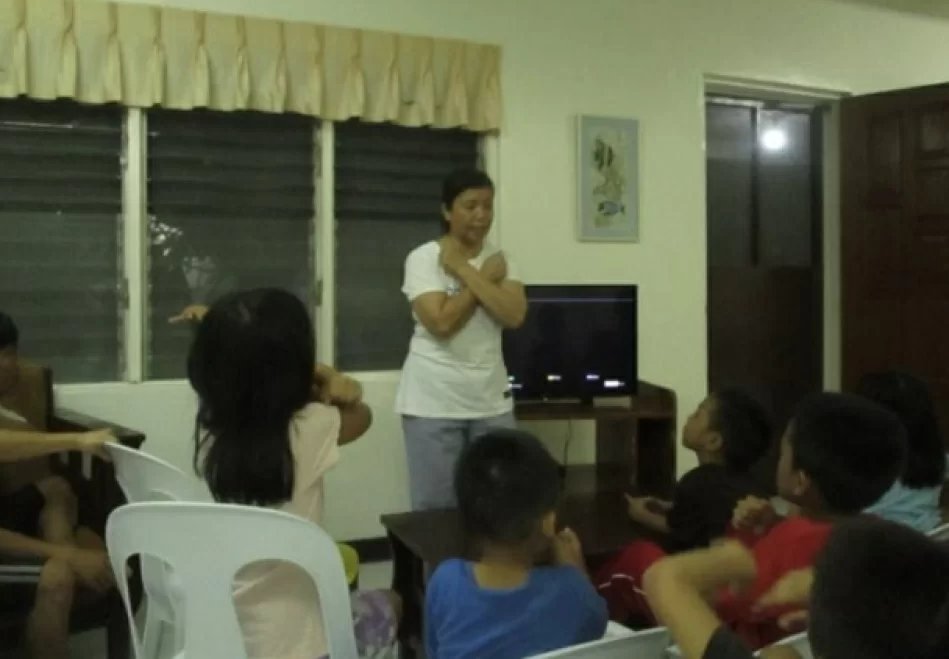
What a Success!
The fourth quarter of the school year was about to start and we decided to move up some students who were academically progressing to a new grade level. I was delighted, excited, and yet a little bit nervous thinking that I would have a new student who is intelligent, gifted, and of course, well-loved by everyone both in school and in the shelter.
The first few weeks were filled with many things to adapt to, and I prayed that the new student would not be too overwhelmed by the change. Slowly, with the help of the responsive classroom approach we implemented, it supports the student to have an easy transition to a new environment.
In our school, we usually do our morning routines such as greetings, group sharing activities, reading of the morning message, and praying before we start our classes. One of the best memories of my journey with this boy was when he first greeted me with my name as his "new teacher" and hugged me. He even asked me about my morning. He was so excited!
The first day with him was not as smooth as I hoped for. There were a few bumps. This was the reason why we observed him in the classroom and modifications were made to suit the student's needs. He would always choose to be the first person in the line, but I explained that we have our rules on "taking turns," and he already had his chance. When I checked on him outside the classroom the next day, he sat on his spot and patiently waited for others to come. I realized that firmness and consistency are two powerful tools to achieve successful classroom management.
Another classroom scene that made my day was when we had our group sharing. Knowing that younger students are visual learners, I added fun pictures to make our sharing more interactive and to get their attention. As I flashed some images on the screen, I heard him laugh as if he was being tickled. It went on for a long time, and it certainly gave his classmates a stomachache laughing with him which caused a little bit of chaos in the class. So, I gave him 30 seconds, and he did stop. It was effective, then we began with our sharing. Since that moment, we've been working on calling the name of the next sharer. He was very observant and quick to realize that he needed to do the same to his classmates. To our surprise, he was able to call the next sharer without his classmate's help and use the phrase "Popcorn, student's name." Everyone in the class was shocked and happy, telling me, "Teacher Lyrah, have you heard him saying popcorn? He learns so fast!" Truly, success happens not just because of one person working as "the teacher," but it includes the students and peers who help one another and have a common goal to lift each other up.
Moreover, I have noticed that he is gifted and very clever. I had set aside things each morning and prepared different materials that he would need to stay focused in our class. These things will be given after each class activity. It was essential to remind him that he needed to finish his tasks then he could use what is prepared for him. Well, being firm with expectations and setting classroom boundaries are challenging at times; however, at CCHS we always do it with love and care.
He appeared to be adjusting into our classroom setting over the next few days. He also loves to participate when being asked. Though, he needed some reminders from time to time for him to stay on track. There was one instance in the middle of our discussion he stood up and asked for his dinosaur books. We stopped, and most of his classmates reminded him to ask permission every time he stands or wants to have something. He did go back to his seat and asked permission. But it was not time for him to read a book yet. So, he participated in our reading first and answered all the activities. Then he got the book for him to enjoy. Another strategy that was very effective to him was giving him a time frame before he could get his desired reading materials. These things didn't come easy, it requires hard work, patience, determination, cooperation, and above all, love. We made a lot of classroom modifications to cater for his needs and the rest of the class.
To be successful in the classroom, as teachers, we need to set clear classroom boundaries for our students.
As Colossians 3:23-24 says: "Whatever you do, work at it with all your heart, as working for the Lord, not for human masters, since you know that you will receive an inheritance from the Lord as a reward."






